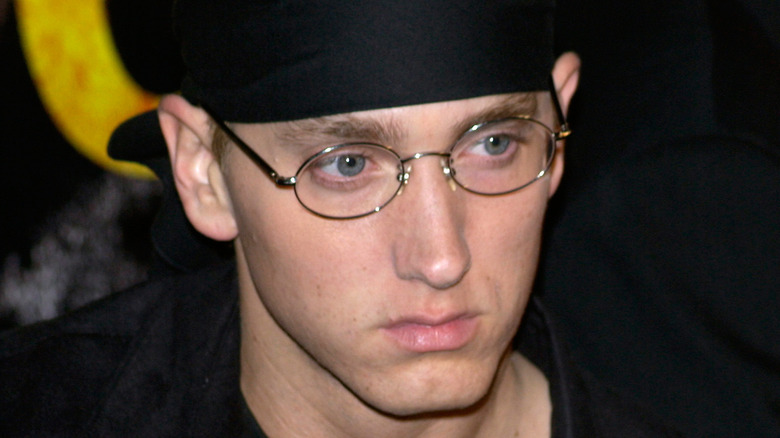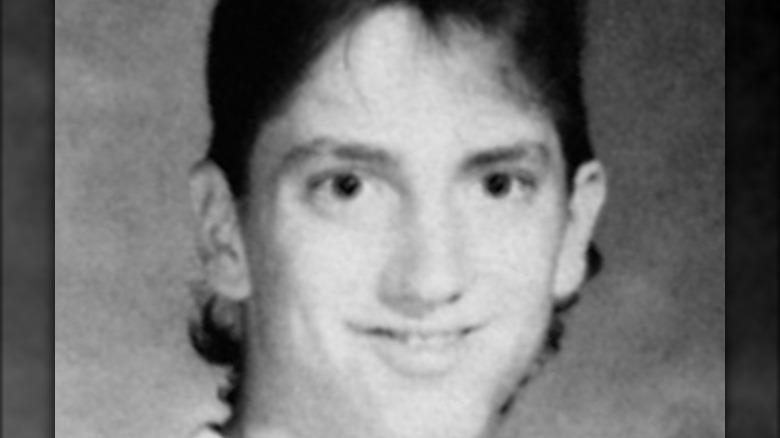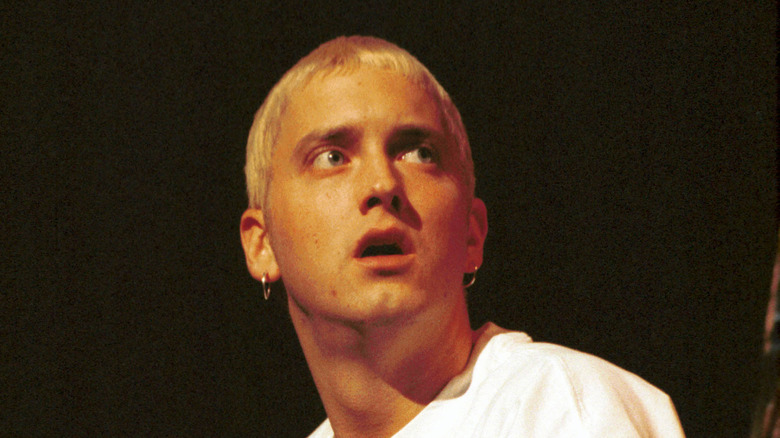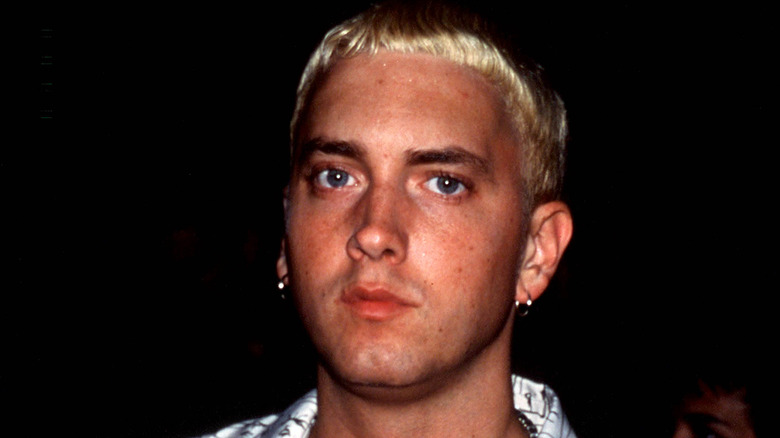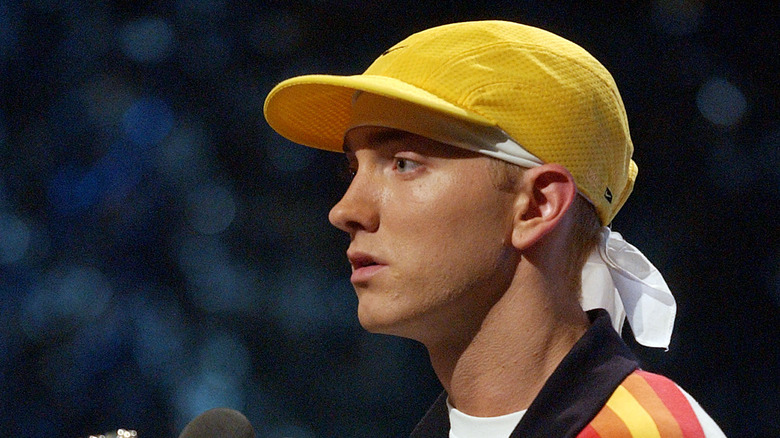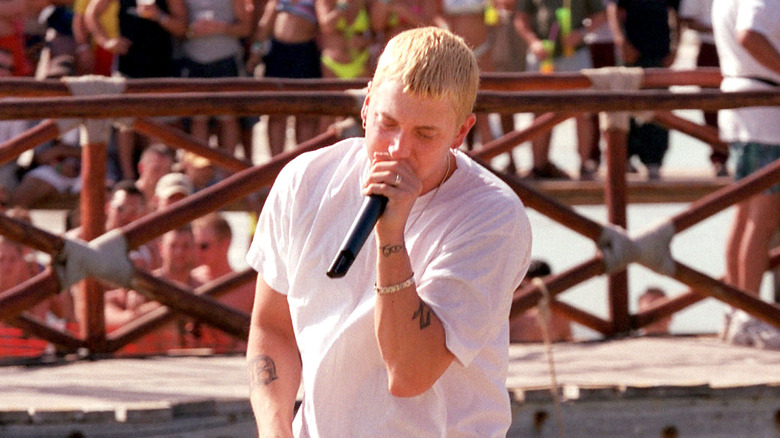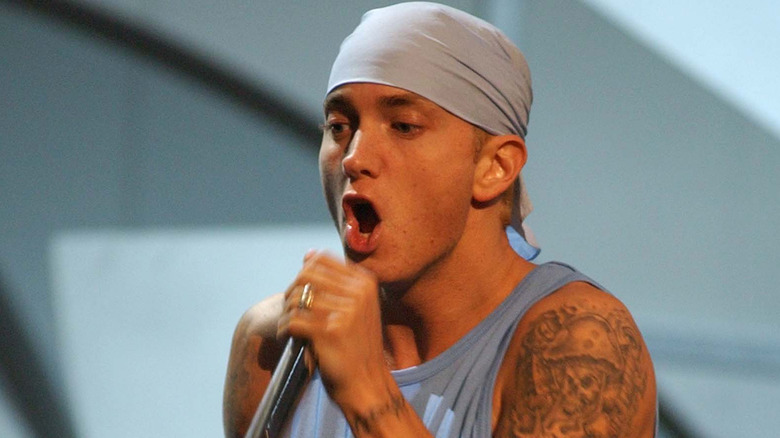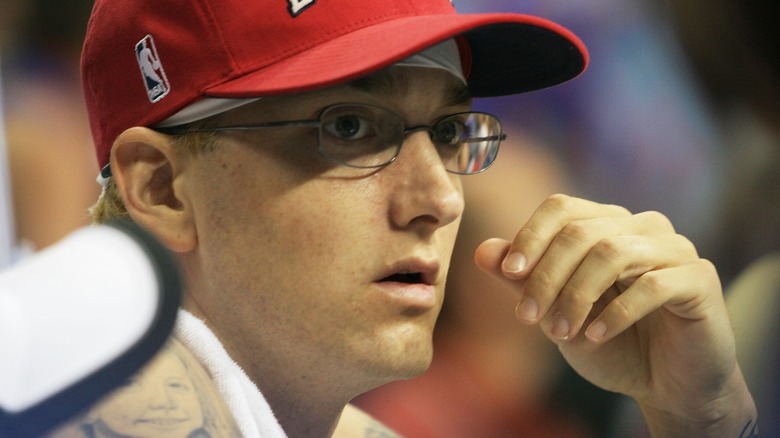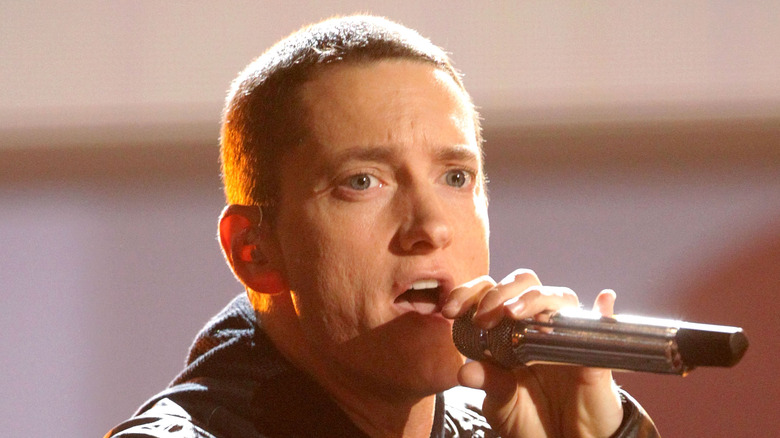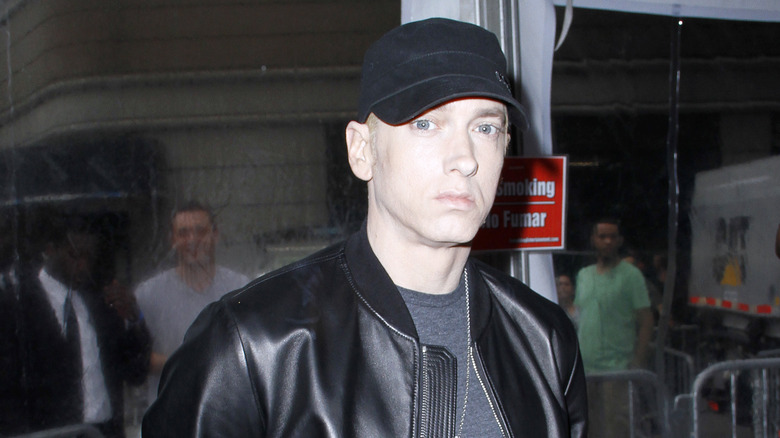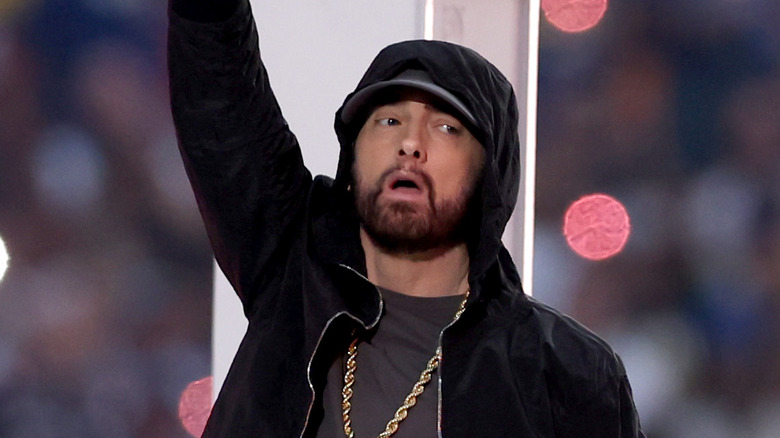The Transformation Of Eminem From Childhood To 49
The following article references suicide and addiction issues.
International rap superstar Eminem has changed the game, shattered records, and broken barriers in hip-hop music. He's one of the biggest rappers in the industry, and is known for his lyrical style and creative rhymes.
A Dr. Dre progeny, Eminem started his career in the late '90s and has only continued to grow. With each year, he has become more and more accomplished, sold more records, and pushed the envelope with his ingenious lyrical flow and controversial opinions. This didn't all come at once, though; the artist has fought for his position in music and in life after a turbulent upbringing.
Despite setbacks, Eminem has achieved commercial success and critical acclaim, steadily growing his fanbase as he ages. The rapper who catapulted to fame with the release of the 1999 single "My Name Is" continues to stay at the top of his game, and decades into his career, he checked off yet another milestone: At the age of 49, he performed at the Super Bowl Halftime Show. From poverty-stricken kid to multimillionaire adult, this is the transformation of Eminem.
Inside Eminem's childhood and teen years
As mentioned, Eminem had a very difficult upbringing. His father left when he was very young, and his mother struggled to keep the family afloat. The rapper lived in Detroit and Kansas City, but moved around a lot, which meant he ended up attending a lot of different schools. As he shared with Anderson Cooper, switching schools so much "was probably the roughest part," noting that he was often bullied for being the new kid.
Though Eminem experienced a lot of hardship while growing up, he found solace in music. When he discovered hip-hop and rap music, his life was truly transformed, especially when he realized his talent for the art form. At age 14, Eminem began rapping in earnest, often entering battles at underground clubs, slowly but surely proving his talent as a rap artist.
As Eminem shared with Rolling Stone, by age 15, he'd dropped out of high school, and his mother was adamant he start paying bills. But instead of working, Eminem spent his spare time rapping.
A look at the start of his career
In 1995, Eminem's life was forever changed by a major life event. His then-girlfriend Kim Scott gave birth to his first child, a daughter named Hailie Scott Mathers, on Christmas Day. Unfortunately for the family, their financial situation was bleak, and Eminem was working overtime to make ends meet, per People.
Just a year later, Eminem's very first record, entitled "Infinite," was released, but it didn't make a difference in their life financially due to dismal sales. When interviewed by Rolling Stone, Mark Bass, an integral part in the making of "Infinite," noted that the goal of the album was not necessarily to be a commercial smash, but rather just to be picked up by a label. "We knew we had a real talent, but it was hard to bust through," he said of working with Eminem.
1996 was a difficult year for Eminem career-wise, and he was dealing with major personal issues, too. Per Vulture, after his first album was released, he attempted suicide. Fortunately he survived, and soon found success.
If you or anyone you know is having suicidal thoughts, please call the National Suicide Prevention Lifeline at 1-800-273-TALK (8255).
Eminem's next era
Many people aren't familiar with "Infinite," the first record in Eminem's discography, as it wasn't a major release. Eminem's next era, one where he worked with talents such as Dr. Dre, was much more successful, and is far more indicative of his overall career as a musician than his first album attempt. Eminem's second album, "The Slim Shady LP," named for one of his alter egos, sold 480,000 copies in just two weeks after its release, per Rolling Stone, and earned him a plethora of new fans.
In 1996, a few years before his breakout record hit shelves, Eminem also formed the hip-hop group D12, which originated in Detroit. Some of the outfit's greatest hits are songs like "My Band" and "Purple Hills." The group rose to prominence quickly, but suffered when Eminem found fame as a solo artist.
In his first few years of stardom, Eminem's whiteness was a major topic of conversation. Some found him off-putting because of his race, while others, like Dr. Dre, didn't mind. "I don't give a f**k if you're purple: If you can kick it, I'm working with you," he told Rolling Stone of his decision to work with Eminem.
His career continued to skyrocket
Eminem found major success in his followup albums "The Marshall Mathers LP" and "The Eminem Show." Both were monster hits, and, in review, some have noted that those two albums, particularly "The Eminem Show," cemented him in hip-hop history.
"The Marshall Mathers LP" spawned hits like "The Real Slim Shady" and "Stan," the latter of which has stayed in public discourse for over two decades, and even produced a new word for a super fan, while "The Eminem Show" was defined by hits like "Without Me," "Superman," and "'Till I Collapse."
Much of Eminem's music has been inspired by real experiences, including "The Eminem Show." As he told Rolling Stone in 2002, "I have songs on the album that I wrote when I was in that sh** last year, with a possible jail sentence hangin' over my head and all the emotions going through the divorce. I went through a lot of sh** last year that I resolved at the same time, all in the same year. And, yeah, that's when half the album was wrote."
Inside Eminem's marriage
In 1999, while his career was soaring, Eminem married his longtime love Kim Scott. The two had a very troublesome relationship full of toxic behavior and blame, but they managed to stay on and off for many years before eventually calling it quits once and for all.
Scott later shared her thoughts on their relationship, telling "20/20," "I don't know if he was a good husband or not." She did go on to call him "an excellent father" who "loves the kids very much." Their unhealthy relationship took a toll on Eminem, too. As he put it to Rolling Stone in 2002, "I would rather have a baby through my penis than get married again." They would give marriage a second shot in 2006 and split up again that same year.
While going through his first divorce, Eminem was also facing a potential jail sentence. Per Rolling Stone, the rapper was charged with two felonies after assaulting a man he saw his then-wife kissing, as well as a separate altercation with the group Insane Clown Posse.
He struck gold with 8 Mile
One of Eminem's greatest career achievements to date came in the form of cinema. The movie inspired by his life, "8 Mile,'' which was released in late 2002, starred the rapper, and was partially defined by the incredibly successful song Eminem wrote for the film. "Lose Yourself," would go on to win him an Oscar for Best Original Song. Although he skipped the ceremony, he did take home a high honor for a song that's still popular today. At the 2020 Academy Awards, Eminem surprised the audience with a performance of the track to make up for the moment he missed out nearly two decades prior.
Although "8 Mile" was based on Eminem's life, the film is not considered a biopic. In a behind-the-scenes interview, the rapper opened up about the cinematic decisions made when creating the film, saying, "Put it this way: if it was based on my life, then it would it would limit me to things I could do, and it would be certain guidelines we had to follow, but with this character, it's like, it's cool because I can do other things with him that ain't me."
Eminem's overdose
Eminem is no stranger to struggles and setbacks in his life, and in 2007 he nearly died after overdosing on prescription drugs. The musician's drug use was significant. As he told The New York Times, "I was so deep into my addiction at one point that I couldn't picture myself being able to do anything without some kind of drug," adding that there are performances he can't remember due to his substance use.
After Eminem's overdose came the road to recovery, and it was not an easy path, as the rapper had to reacquaint himself with the very skill that made him a household name. As he shared SiriusXM's Shade 45, when he was making 2009 album "Relapse," he "first started learning how to rap again, because of the drug situation." He noted that he found himself "having to relearn a lot of things" after he got sober.
If you or anyone you know is struggling with addiction issues, help is available. Visit the Substance Abuse and Mental Health Services Administration website or contact SAMHSA's National Helpline at 1-800-662-HELP (4357).
Eminem's career after his overdose
After he became clean, Eminem's career took off again. "When I got sober the lid just came off. In seven months I accomplished more than I could accomplish in three or four years doing drugs," he told The New York Times about his career post drug use. Following his sober journey, Eminem released a couple albums that both proved he still has rap prowess, and he only continued collecting number one on the Billboard 200 chart.
Eminem worked with his longtime friend, mentor, and collaborator, Dr. Dre, to reintroduce himself after sobriety, and ensured that listeners would be satisfied by his new music after learning more about what they wanted from the rapper. "My fans, and people who genuinely listen to hip-hop and love it for the art form, they know what's Eminem, what's Marshall, and what's Shady" he said to the NYT about his album "Relapse," which he released in 2009, noting that all three of his personas come out in the album.
If you or anyone you know is struggling with addiction issues, help is available. Visit the Substance Abuse and Mental Health Services Administration website or contact SAMHSA's National Helpline at 1-800-662-HELP (4357).
Eminem's lifestyle changes
After leaving rehab, Eminem made a number of significant lifestyle changes. Eminem opened up to Men's Journal about his journey to health and fitness, and how he took up a new exercise regimen. "I guess I'm pretty compulsive working out," he shared. "I feel like if I step away from it for too long, if I have a crazy week and take a five-day break, it'll be like starting over.
Eminem also noted how the drugs affected his eating habits, saying "the coating on the Vicodin and the Valium I've been taking for years leaves a hole in your stomach, so to avoid a stomach ache, I was constantly eating — and eating badly. When I got out of rehab, I needed to lose weight, but I also needed to figure out a way to function sober."
In addition to these diet and exercise changes, staying productive continued to be a key part of his lifestyle. "I'm working all the time to stay out of trouble!" he told The Guardian in 2009. "Aside from spending time with the kids, it's all work for me right now."
If you or anyone you know is struggling with addiction issues, help is available. Visit the Substance Abuse and Mental Health Services Administration website or contact SAMHSA's National Helpline at 1-800-662-HELP (4357).
His 'powerful' Super Bowl performance
Eminem has hit career heights that some people only dream of, and in early 2022, he took things even higher when he headlined the Super Bowl Halftime Show along with Dr. Dre, Snoop Dogg, Kendrick Lamar, and Mary J Blige. The performance was lauded by critics and onlookers alike for its celebration of hip-hop, and what many see as a long overdue genre takeover of the show. As The Hollywood Reporter said, the show is "likely to go down as one of the most entertaining in history."
Eminem performed his hit "Lose Yourself," and took a knee to protest police brutality and show solidarity with the Black Lives Matter movement and Colin Kaepernick during the show. "While Eminem did not explicitly state he was kneeling in solidarity with Kaepernick," Time wrote, "the visual was powerful and sparked meaningful dialogue."
Despite his years of experience performing for a live audience, Eminem was nervous prior to the performance. As he told Sway Calloway, "I'm gonna tell you, it's f**king nerve-wracking ... there's nothing more final than live TV," adding that any mistakes would live in posterity. Fortunately for the rapper, his performance was error-free, and a career highlight for the self-proclaimed "Rap God."

